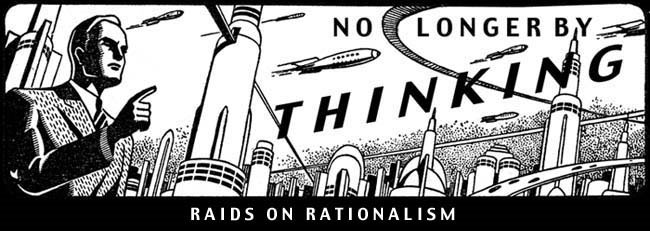The Cato Institute is an intellectual stopped clock. When right thinking aligns with dislike for centralized authority, the one clear notion at the heart of its libertarian faith, Cato is right on. If the White House decreed tomorrow that we must all get the Number of the Beast tattooed on our foreheads, Cato would be there for us, man! But when reality doesn’t align with its fixed idea, Cato opts for fantasy.
Case in point, as Rod Serling might say: climate change. Cato is brewing up a full-page ad respectfully telling President Obama that it is just not true that the science on climate change is settled. Why, look at this list of credentialed names we have produced. All these PhDs reject the “consensus.” Isn’t it obvious that there is at least room for honest doubt? That at least some independent thinkers are refusing to bleat along with the rest of the white-coated sheep?
Listen to that word “consensus.” It gives me the willies. We should exile it from the discourse. It has the same leaden ring, the same negative semantic charge long accumulated, as “dogma,” “doctrine,” “orthodoxy,” “party line.” Who or what, except a group of vaguely-imagined New Agers trying to decide where to plant the quinoa without hurting any feelings, works by “consensus”? The word smells of doubts suppressed, of group approval sought. No wonder so many people who know some science, including a few once-brilliant folks like Freeman Dyson (now slipping into a particularly spectacular and public dotage, climate-changewise), are eager to declare their independence from “the scientific consensus on climate change.” I sympathize. Screw the consensus. Speak up for the truth, every time.
The problem: scientifically, in the special sense discussed above, there is no “global consensus on climate change.” That is, there is no touchy-feely global community of scientists all Om-ing together to drive out the vibes of dissent. There is an overwhelming, complex, convergent, stewing, bubbling, ongoing mass of good work done by the best people intimately involved with the data, the uncertainties, and the alternatives. This is not a process of “consensus” in the sense of a show of hands, the adoption of a common view for the sake of happy harmony. This is the largest body of hard-core, peer-reviewed research on a single topic ever done in the history of science. There are mathematical models, ice cores from Antarctica going back 800,000 years without a glitch, measurements of the shrinking gravitational pull of Greenland’s melting glaciers, sludge cores from the bottoms of the oceans, instrumental records, tree rings, sea-level measurements, satellite measurements of land, sea, and air temperature . . . why, just to name the categories of information that have been enlisted to shed light on whether (a) climate is warming (b) humans are the cause (c) the warming will continue and is dangerous would take a whole page of single-spaced fine print. The answers are Yes, Yes, and Yes. Stay tuned for resolution of all details -- but Yes.
The Cato Institute people seem to dislike these answers because they threaten, by implication, to empower governments. If climate change is real, human-caused, and mitigable, then government action is obviously essential to saving our collective ass. Since all government action is disasteful to Cato, from Wall Street bailouts to public schools, it seems clear to them that science cannot be telling us what it seems to be telling us. There must be some kind of mass delusion or fraud afoot. Our libertarian desires are an infallible index of reality, are they not? At least that much is clear!
But climate science's triple Yes (climate change is real, our fault, bad news) is not a “consensus,” a manufactured consent. It is just science. It is exactly the same kind of science that tells us how the Solar System runs, what the stars are, how DNA works, how transistors transist. Some people -- hundreds with science degrees, as Cato shows -- don’t like what science is saying. That is understandable. Science is telling us that we are in a frig of a mess and that we are sliding deeper into it, maybe to a disastrous degree, especially if we don’t make some highly annoying changes to the way we live and make them fast. So they blink. They suddenly conceive of themselves as independent-minded truth-lovers resisting a phony “consensus.”
“Science isn’t democratic!” they bark, while Cato holds out its microphone. “Scientific truth is not decided by a show of hands!” True, very true, although a show of hands is an odd way to make that point. And the science on climate change has not, in fact, been decided by hand-counting. It has been decided the hard way, the old-fashioned way, the scientific way, piece by piece, dispute by dispute, fact by fact. The natural and healthful friction of that machine, that is, the fact-based disputation which is the basis of scientific integrity, is amplified and distorted by the “realists,” as the fantasists like to call themselves, until in their picture there is only friction, no machine. Only uncertainty. No science. No knowledge of the real world. No meaningful -- spit between fingers! -- “consensus.”
I am fascinated by the fact that Creationism operates in the same mode. In Creationist public relations, petitions of this sort -- declarations of incompetence signed by hundreds of dissenters with science degrees (almost invariably opining out-of-area) -- are a tradition. While the Cato Institute is assembling its Roll of Cluelessness for pricey publication in the New York Times and elsewhere, it might wish to check out the competition over at the Discovery Institute, which offers a long list of credentialed people who think evolution is hogwash. Its structure is the same. Its function is the same.
Its value is the same.
-






:)
ReplyDelete